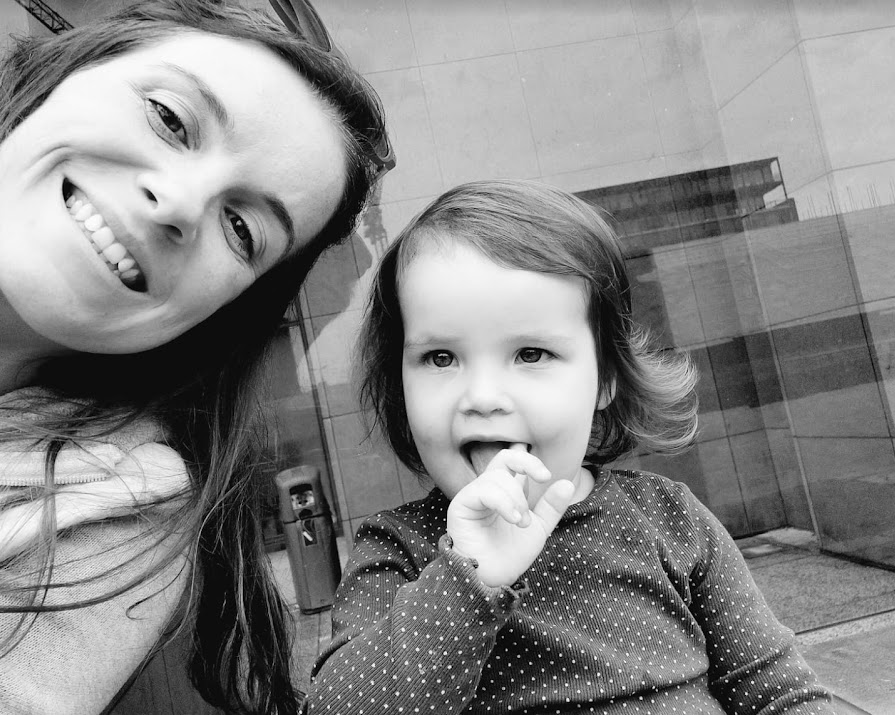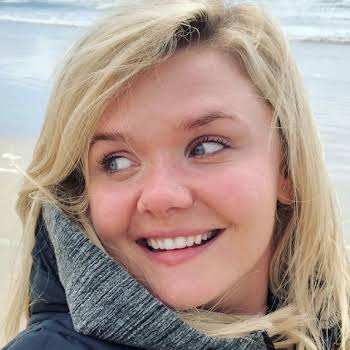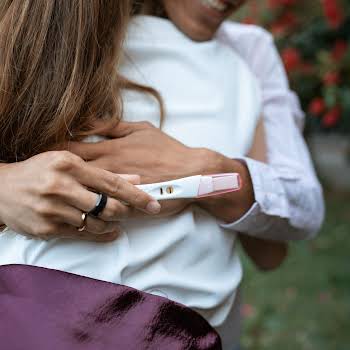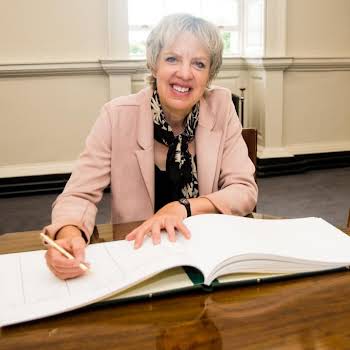I was blindsided by how upset saying the words ‘I’ve miscarried’ or ‘I need a D&C’ out loud made me
By Dr Clare Moriarty
17th Sep 2023
17th Sep 2023
Dr Clare Moriarty writes a poignant personal essay about her own experience of pregnancy loss and the aftermath.
There’s something about the tiles in Holles Street.
I had a visceral reaction to them when, a few days after my daughter was born, I had to go to A&E. This time, this pregnancy, I don’t notice them again until I’m sitting in the queue in outpatients, but they have an impact on me I struggle to explain.
I have brought too much with me to this routine appointment. I put my backpack on my lap, jacket in the bag, water bottle between my feet on the floor in front of me and try to be as narrow as I can be on the bench in the busy rooms. Eventually, they take my weight and height and I go into the little midwife’s office adjoining the waiting area. We discuss my issues with anaemia last time — it’s only my booking appointment (12-14 weeks), so if I start building up the iron now, I may find it more manageable in the late stages.
Advertisement
Complex
She gives me more pamphlets, one on breastfeeding which I don’t want, but I also don’t want to spoil the happy mood by refusing it, and a leaflet about whooping cough and the flu jab. She hands me instructions for haematology and I head back down the corridor into the bloods waiting room. I now really have too much in my hands and start sorting what can be in the bag and what I actually need to hold.
I ask the only woman in that waiting room does she mind if I eat a satsuma (or whichever member of the small orange family I actually have). I didn’t eat lunch before I left and am worried the bloods will reflect this, but she’s in an advanced state of pregnancy and citrus is a strong smell. She says of course she doesn’t mind
I am hesitant to introduce a new type of damage to my body.
After I get my blood taken the nurse says I’ll hear about the bloods by phone if there’s anything unusual to report. I can head back into the waiting room to see the doctor. A while later in consultation room two, I knock on the door and the doctor introduces herself. We talk about my patient history for what feels like ages. My last birth was “COMPLEX” and my file on the system is extensive. At various points in my mentioning certain issues, she noticeably winces.
Towards the end, she asks me what I’m thinking for this delivery. I tell her I’m really not sure, and I’m not. On the one hand, I feel a section would be safer for the baby (at least if it’s anything like my daughter in proportions and the labour goes similarly), but I am hesitant to introduce a new type of damage to my body, and though my own recovery has been slow and imperfect, it is at least familiar terrain now.
And, as a swimmer, I’ve always had a strong core and the idea of cutting through it does frighten me. I also have a toddler and would find it tough to be confined to bed in the first days of introducing her to her sibling.
Advertisement
I already know we’re in trouble
In hindsight, I find it difficult to remember how many seconds it took for doom to really set in while she rummaged around.
This pregnancy has been strange too, I tell her. I explain I had a “disappearing twin” and that my first early scan showed a second sac but that everything was too small to say anything with certainty. I waited a fairly exasperating two weeks to have another scan and saw a lovely little singleton pregnancy at that visit. There was some confusion about the dates—the scanning midwife adjusted the expected due date to a later one than my cycle dates suggested. That second scan seemed fine, and the heartbeat was really robust.
I manage to find a photo of the paperwork in my phone to show her the adjusted gestational dates she wants. After what seems like quite a lot of chatting, I unzip my trousers, fold them into the seam of my pants, and swivel around onto the bed for the scan. “Cold gel here,” she warns, and moves it around my stomach with the scanner.
In hindsight, I find it difficult to remember how many seconds it took for doom to really set in while she rummaged around. Panicking, I say “I think the second sac is still in there, or, at least it was, a few weeks ago.” I suppose I was hoping it might be obscuring visibility somehow, but I already know we’re in trouble. After all, I have seen this baby’s heartbeat twice before. A small being, but a determined beat, and there is just nothing active happening here at all. “Have you been having pregnancy symptoms?” she asks me. Brutal.
“Just tiredness,” I say, crushed. I have a toddler and am a week and a half into a new job—of course I’m tired. Eventually, she finds what she is looking for, but the measurements are wrong. It’s too small. She is careful to remind me that she’s not diagnosing anything, but eventually says something like “but you can see what I can see”. Apologising for not having good news, she tells me I’m going to have to go upstairs to the better machines. She’s really sorry and she’s going to tell them, and they’ll be waiting for me.
Bad news
At this juncture, she steps back into the shared corridor behind the consultation rooms and I am confused about whether I am supposed to head on up myself at this point or wait for her to come back in. I wait a few seconds and send my husband a message. Pretty sure it’s bad news. Heading upstairs for another scan but I would prepare for the worst. Uh, I’m so sad.
Advertisement
My previous message from twenty-five minutes earlier is me asking him to grab some extra Galfer from the pharmacy on the way home. His office is nearby, so he says he’ll head over. It’s painful looking back now and thinking how confident I must have been to tell him not to come to the appointment.
The timings were tricky – he’d taken retroactive parental leave recently, and it was his first day back and we thought there might be a lot of waiting around, all in service of a likely ten-minute consultation. I’d done the whole previous pregnancy in solo appointments because of Covid, and I really just wasn’t nervous. I was over 12 weeks and I’d seen this baby display a vigorous heartbeat recently.
“You’ll be at the 20-week one,” we’d said. I’d practiced making a video of the scan in the waiting room. I end up slipping out of the room before the doctor returns. I know where scanning is — I can’t think what more she can have to say to me. I drift back into the main corridor and towards the main stairs.
It’s a momentous event in your life, but for them it’s just Tuesday.
At the booking desk, I manage to say that I’ve been sent up from outpatients and that they think it’s bad news. She sends me to Waiting Area B, which is empty. I spend so much cognitive energy in the next hours and days thinking how routine this kind of personal tragedy is in this building. Like dealing with a morbid wedding planner… it’s a momentous event in your life, but for them, it’s just Tuesday.
Drifted
And that’s not to say that people are insensitive, but there is a painful imbalance between how fraught these moments are for you, and how statistically regular they are for the people administering you. And then, that imbalance itself resides in a swirl of passing enthusiasms and excitements where the people around you are whispering excitedly about baby names and likenesses, or at least, that’s what I was doing when I was in their shoes.
Advertisement
I am called into the scanning unit by a lovely woman with a name I have considered as a baby name, and she summarises my last appointment and tells me she’s really sorry to be meeting me under these circumstances. Me too, I think, because she’s so gentle and kind. My husband arrives at the end of this scan, but before that, she has a hard time getting a very good view of things. It’s sort of drifted into a recess, and she explains that that makes it difficult to get a very confident perspective.
I know what I am looking at
This is strange to me, because I feel like I have a perfectly decent view of things at this point, and it is what we are looking for — a little foetus with no heartbeat. She says she thinks she will need to confirm it with a transvaginal scan. As much as, like every other patient before me in this scenario, I came up here desperately hoping to be the one person in a million that might somehow get good news (maybe my bladder was too full, maybe the sac with no heartbeat was the disappeared twin and the other one is fine and just unbelievably well hidden somewhere…), I know what I am looking at, and it doesn’t need to be confirmed transvaginally.
I still haven’t looked at the contents of that envelope, the last component of a very sad and short photo album I probably won’t compile.
I tell her this, and that I’m happy for her to look around a bit longer to get a better view, but that I don’t feel like I need the additional reassurance if that’s her primary motivation. She eventually gets a better angle, and our shared confidence in the misery of events passes some unspoken threshold of certainty. She asks me do I want a picture. I say no, but then think that Matt might, so ask for one. I still haven’t looked at the contents of that envelope, the last component of a very sad and short photo album I probably won’t compile.
I’m so sad
My husband arrives into the room and hugs me. I think I just say “I’m so sad” a few more times. I’m still carrying all my paperwork from downstairs, and she asks me should she take it. I look through the various bits as though there’s something I might need to keep, but obviously, there isn’t, it’s all staging instructions for a play I’m no longer in. I ask immediately what’s next. Sadly, numerous of my friends have had similar bad news, and I know there is far to go from here before it’s all finished. We have to wait for a doctor to become free to discuss options with us.
It is a sad thing to discover that the little paunch you have been petting on your way to sleep in the evening is not alive, and may not have been for quite some time, and the phenomenology or change of feel in that transformation of awareness is undeniably distressing.
Advertisement
Back to Waiting Area B. Mercifully, it’s still empty. We discuss topics that now seem absurd. We were supposed to go to France the following morning for a wedding. Matt’s dad was joining us in Paris and he was going to help with minding Niamh so we could enjoy the festivities. It will all depend on when we can get an appointment for whatever is next. Maybe Matt should go, and my mum should take me… maybe it will be hard for me to be around Niamh in the aftermath, so would it be better to disrupt current plans as little as possible?
Transformation
Already, I am just desperate to get to the end of this particular part of my life. Naturally, I just want to be pregnant again, but more so, I no longer want to be in the midst of this situation. It is a sad thing to discover that the little paunch you
have been petting on your way to sleep in the evening is not alive, and may not have been for quite some time, and the phenomenology or change of feel in that transformation of awareness is undeniably distressing.
An hour later, a doctor calls us in. She, too, is lovely, and explains the options. There’s the conservative option, an option involving pills at home, and a surgical procedure. Matt asks me on the way home who might opt for the conservative option, which is where you just go home and let nature take its course. I have thought about it a lot since. “People in shock?” I said at the time.
Distress
Without any discussion, I tell her I would like to have the surgery as soon as possible. I want completion and I want certainty, and I want my uterus to return to initial conditions so I can begin again. It’s a Tuesday. She says it looks like it won’t be possible to get a booking before Monday. I plead with her, explaining that the measurements make it seem like it’s already been dead in there for quite a while, and, remembering the importance of explicitly voicing things to physicians, I tell her: “it distresses me to have it continue to be there.”
She says she will do her best and I will get a call in the morning to confirm an appointment. She gives me a cert for work. I ask how long it is normal to take off (perversely, I have been anxious about publishing commitments recently and am
guiltily thinking that a mandated rest might give me a chance to work on some editorial revisions).
“Two weeks. At least,” she says. She gives me a cert up to the 30th , which will see me return to work on my birthday. I now have a very different set of papers in my hands. A smooth exchange of paperwork — I have pamphlets on miscarriage, and documents explaining the “evacuation of human remains” surgery, advising what to bring, what will happen on the day.
Advertisement
Loss
I text a few people on the way home to let them know: my mum, close friends, the friend I had said I’d send a scan pic to a few hours earlier, my boss who’d asked me to let her know how I got on. Everyone is so shocked, but so kind and swift with the offers of support. My mum is at the front door of the building dropping off flowers when we eventually get back. We all have a hug, and I head inside to sit, shell-shocked until Niamh has to be collected from creche. We’ve been talking to her a lot about the baby, and she’s at that age where her comprehension far outruns her communication, so we wonder how much of it she’s taken in.
Not only is she a sunny, gag-loving distraction from the pain and shock, but she is a walking, talking reminder that my uterus is capable of seeing a pregnancy through.
Though we’ll stop the talk of a “baby in mama’s tummy” that she’s found so amusing and confusing (causing her to point and gesticulate at her own tummy) we’ll continue to talk about wanting a baby and our plans for her to be a big sister soon. When she eventually gets home, she is a huge comfort, and in more senses than one. Not only is she a sunny, gag-loving distraction from the pain and shock, but she is a walking, talking reminder that my uterus is capable of seeing a pregnancy through.
At least in principle, there is no reason I shouldn’t be able to do it again. I think so often in the next days about families who miscarry on their first and don’t have that comfort and reassurance, and how difficult it must be. I remind myself how lucky I am.
The misery of the thing
It takes me until 10pm to remove the taped little dab of cotton wool they used to stop the bleeding after they took my bloods. I wonder whether I’ll ever hear about those bloods, or whether some mechanism in the hospital just kicks in that wipes out any ongoing processes once a miscarriage is confirmed. This curiosity is quieted by the arrival of my 20-week scan appointment the morning after.
She says, “I love you” and “I love you, mama” for the first time in these days.
Advertisement
For a while, our flat heaves with the misery of the thing. I don’t manage much in these days; I collect Niamh from creche and potter around a bit. I respond to kind texts and keep work updated. Based on my last period, I was over 13 weeks at the appointment, so I had told a lot of people I was expecting. These people are all updated with one of two drafted messages that include a reference to my desire to be through the bad-news-telling phase.
I do actually “try to rest”. I’m scared of overdoing it and somehow kicking off the miscarriage at home. I’ve chosen the high-intervention option; I don’t want to pre-empt my procedure. Niamh, usually a pretty solid sleeper, wakes at 3am every night between the Tuesday and the surgery
She just needs to be hugged and re-settled in her room, and maybe this is good for both of us. I find myself rolling out of the bed to do it before Matt, at least. Children are intuitive. She says, “I love you” and “I love you, mama” for the first time in these days.
I am desperate to have the appointment confirmed and set a spiritual end date on this series of events.
The day after the bad news was unpleasant. I didn’t receive a call with an appointment in the morning, so at 12.30, I ring the bookings line to try and find out. I am desperate to have the appointment confirmed and set a spiritual end date for this series of events. This is the only part of the process where I have unkind thoughts about the hospital. I spend a lot of time on the phone being bounced around to different departments and painfully having to say again and again that I got bad news yesterday and need a D&C appointment.
I am not booked in with Unit Four, I need to talk to outpatients; outpatients say I need to talk to a doctor from the ultrasound ward. I really don’t want to hang up after all of this, because I feel a craven need to cross something off the list of obstacles/steps between now and the time after this ordeal.
Advertisement
Blindsided
Eventually, I am told I’ll need to wait for a doctor to ring me back. When she rings, she tells me it will be Friday, which is an enormous relief. She says it would have been the following Thursday, but she went higher up – ultimately, the administrative delay was probably compassionate.
I think about writing to the hospital and suggesting a streamlined process for booking D&Cs, or at least a system where there is just one phone line for this set of issues. As anyone with shared experience can attest, voicing the reality is painful, and often in moments when I felt pretty okay about what was happening overall, I was completely blindsided by how upset saying the words “I’ve miscarried” or “I need a D&C” out loud made me.
I found the idea of sitting and waiting with the more successful intake at general admissions pretty grim. It gets pushed back to 1pm, and after not too much waiting and question-answering, I head up to Unit Four alone. I get out of the lift on the third floor, and I look confused, because I can’t see an obvious sign for what I’m looking for. A man who works there says “you know this is the third floor?” in a way that suggests he thinks I got out of the lift at the wrong moment and should instead be on the floor below getting a scan. On some level, I agree with him.
I keep walking and find an admissions area eventually. My hearing is not perfect and I struggle a little bit with masks and hearing people clearly, so I’m not confident I’m hearing everything I am being told by the nurse who shows me to my room, but I wonder how wrong I can go. A friend who had this procedure here recently has been really helpful in talking me through it. It’s been a huge comfort and I think about her a lot on the day.
At ease
I get into the hospital gown, put on the anti-embolism socks and sit perpendicular to the lying angle of the bed, knitting. I am visited by a nice anaesthetist, and she is really pleased with my knitting. The surgeon comes in for a chat about the procedure. It’s reassuring talking to her, and though neither the anaesthetist or the surgeon I met are the people who end up with me in theatre, they put me at ease and set me up well.
The more detailed the loss, the sadder it seems.
Advertisement
The midwife who runs the Poppy Clinic (which I attended because of complexities with my last birth) comes up to visit me and gives me a hug that I appreciate very much. We talk about trying to conceive again, and she tells me how it will go, when, hopefully, I am next back in. I’d been in touch with her a few times during this pregnancy because of the
confusing initial early scan and it is so nice to have a continuity of care that allows you to feel like you don’t have to start fresh with someone each time. I feel lucky to have her concerned with my case.
Some of the questions I was asked before the procedure gave me pause. My pregnancy is far enough along that they may be able to tell me the sex of the foetus from the remains. Looking back, it was hard to answer this on my own. I said no, because the more detailed the loss, the sadder it seems.
Angels
I’m moved by what feels like the sad little camaraderie of a joint coffin for the day’s patients.
But, I wondered would Matt want to have known. I am still not 100% sure I am catching everything the nurse is saying because I can’t see her mouth and it’s noisy from the construction, but she asks me if I’m happy with the hospital handling the remains. I say I think so but ask what it amounts to.
She says, usually, where they find sufficient remains, all the little ones from the ward that day go in a little shared coffin and are buried in a little ‘Angels’ plot in Glasnevin. My grandparents are in Glasnevin, so I think it will be good to take a trip up there to commemorate the little one. I tell Matt that I’m moved by what feels like the sad little camaraderie of a joint coffin for the day’s patients. He feels the same.
Surgery
I don’t want to him to think I’m happy, because it feels like a disservice to the little subject of the surgery.
Advertisement
The cervix-softening pills that I took before I left home are taking effect and I’m a bit embarrassed about whether I might bleed if I stand up. I put my pants back on and hope for the best. When the time comes to go to theatre, I am told to bring my pillow and they look for a hairnet for me. A gentle, Scottish midwife talks things through with me again. A different surgeon comes and introduces himself. I tell him again about previous surgeries, my relatively unexciting medical history
and reiterate that I have no questions.
When we go into theatre, a new anaesthetist is having a terrible time with my veins. He wants to canulate me in the back of the hand rather than the inside of the elbow; he performs a routine of vein tapping and shifts in and out of different positions, giving deep scrutiny to my hopeless little hand veins. I tell him about my medic ex-boyfriend who always commented on “nice sets” [of veins] where he saw them and seemed to find it hard not to think about cannulation in otherwise normal situations.
I joke about how disappointed he must have been with the domestic option. I tell the anaesthetist about the time I told the NHS blood clinic I wanted to donate platelets and the nurse laughed and said I was lucky to be giving blood at all with “these things”. I consider making a joke about having quite ugly hands, but finally finding my hand-modelling niche in anaesthetist training videos. I don’t make the joke, because I don’t want him to think I’m happy, because it feels like a
disservice to the little subject of the surgery.
Relieved
I explain that the good elbow veins are in my right arm, and he rightly notes that they’ve just taken blood from them.
He eventually puts a line in my left elbow and pretty shortly thereafter either he or the midwife hand me an oxygen mask. They tell me I’ll soon be very sleepy, and almost immediately I feel like I’m in my early twenties at a festival and am experiencing the beginnings of something I shouldn’t have taken. The next thing I know I’m awake again. I remember straining to ask a sensible question to show that I’m lucid. A new medic is asking me how I’m feeling. I say I’m fine, thanks.
I can’t believe it is only 3.40-something. I remember checking the time just before walking into theatre and it was 3.10. I am so incredibly relieved it is over. They wheel me back to my room and along the way, the surgeon says he will be in to chat in a few minutes.
They feed me toast immediately. I haven’t eaten since 7pm the night before, and I eat three pieces quickly. I’ve been extremely dehydrated all day from the fasting, so I finish a huge jug of water in a matter of minutes. I text my husband to say I’m alive and out of theatre by 4.00, sending him a picture of the toast.
Advertisement
I am able to leave by 5.30. On the ramp out front, I message a colleague while I wait for him to arrive. I have spelled his name wrong in an article and am telling him I will change it.
It feels good to be doing something normal, and I am surprised at how okay I feel now that I believe I am on the road out of this. We go home and watch a Tom Cruise film and eat takeaway.
If you’ve been affected by miscarriage, molar pregnancy or ectopic pregnancy, Miscarriage Association Ireland provides support and information. You can contact the helpline at ??01924 200799.
This article was originally published in September 2022.























